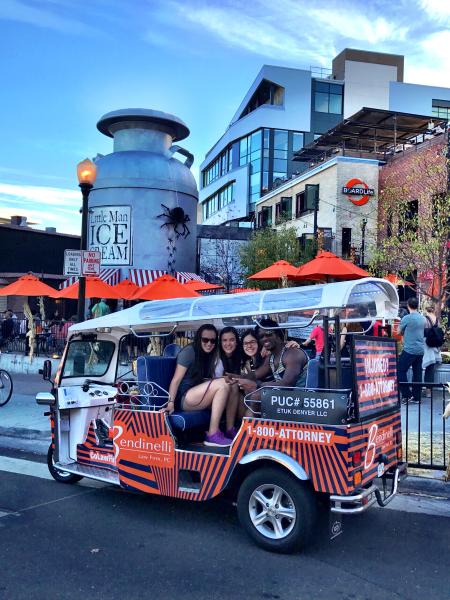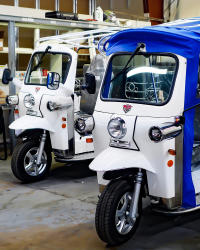eTuk Ride is on a mission to help strengthen Denver’s community, bolster emerging neighborhoods and ease parking woes. That’s a big feat, but they believe smaller and simpler is better. Their answer is six-seat, electric-powered, completely modernized rickshaws.
In 2015, friends Walid Mourtada, Colin Sommer and Michael Fox launched eTuk Ride after a trip to Guatemala. Memories of cruising across towns in three-wheeled buggies left the entrepreneurs with an idea: Why not create a similar, more sustainable version for urban cities in America? The three men had lived in Denver for more than 15 years, so the question of where the vehicles would be made was moot: They’d have to be manufactured in The Mile High City. “The guys have a very Coloradan, local-grown spirit,” says Lewis Davis, eTuk’s general manager.
 They aimed to help solve the “last-mile concept,” which refers to the difficulty of getting people in big cities from train and bus stations to their destinations. They do this by circulating eTuks downtown as well as in surrounding neighborhoods and shuttling people for free. “We don’t want to price anyone out,” says Lewis.
They aimed to help solve the “last-mile concept,” which refers to the difficulty of getting people in big cities from train and bus stations to their destinations. They do this by circulating eTuks downtown as well as in surrounding neighborhoods and shuttling people for free. “We don’t want to price anyone out,” says Lewis.
For decades, commuters and travelers in India, Europe and Latin America have relied on tuk-tuks to navigate congested streets in an efficient and cost-effective manner. But the eTuk guys needed to address some drawbacks. Their electric version of the tuk-tuk is quiet, safe and eco-friendly compared to its foreign counterparts. Vehicles are charged for eight hours on standard 110- to 220-volt systems and garner 60-mile ranges, cruising at speeds of up 25 mph. While the frames come from Thailand, the majority of parts manufacturing and the entire assembly is done in their River North Art District (RiNo) factory.
 Right now there are seven eTuks operating around the city. By the end of the year the team plans to expand to nearly a dozen. “We want people to be able to experience as much of the city as they want without getting frustrated about traffic or having to deal with parking,” says Lewis.
Right now there are seven eTuks operating around the city. By the end of the year the team plans to expand to nearly a dozen. “We want people to be able to experience as much of the city as they want without getting frustrated about traffic or having to deal with parking,” says Lewis.
Most of the tuks circulate downtown, and those can be hailed, like a cab, or by using a mobile app. On first Fridays and every Saturday of the month, eTuk has designated stops in RiNo to allow visitors to explore the entire neighborhood without having to worry about parking multiple times. “The plan is to recreate this in other parts of the city,” he says.
The trend is catching on beyond Colorado, too. The Denver-made vehicles can be found in 23 states across the country, where city planners and community members are following Denver’s lead in providing an eco-friendly, travel alternative using eTuk vehicles.
The brand’s latest venture is in the area of tours, which launched in December with a holiday lights excursion. It continues now with a sightseeing tour (scoping out areas such as the Colorado State Capitol, Larimer Square and the Cherry Creek area), as well as two brewery crawls that play up RiNo’s ever-growing craft-beer scene. They also have a cider tour with plans for a food-tasting tour. The tours highlight eTuk’s communal and social aspects. “The carts are designed to seat six people with two rows facing each other,” says Lewis. “As soon as people get in, they get a smile on their face. They’re more apt to engage with other passengers even if they are strangers.”
In the end, eTuk’s aim is a noble one: transport people with minimal impact on the environment.



